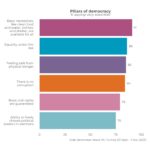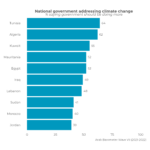The latest Arab Barometer surveys reveal some surprises.
Last month, Nasredeen Abdulbari, Sudan’s justice minister, announced the end of bans on alcohol and apostacy, and prohibited the use of traditional corporal punishment. These moves are part of a wider effort to shift away Sudan from traditional sharia, or Islamic law, which has been the basis for law in Sudan for decades.
Some observers in the West might see this news as Sudan taking a step toward liberal democracy, recognizing that the transition remains delicate. But survey data from Arab Barometer — a nonpartisan research network providing insights on the views of citizens across the Arab world — suggest that Sudan’s population may not widely support these moves. The December 2018 survey, completed less than two weeks before the outbreak of the revolution, revealed 61 percent of Sudanese say that the law should be based entirely or mostly on sharia, while almost a third of the population (27 percent) say the law should be equally based on the law of sharia and the law of the people. Only 10 percent say the law should mostly be based on the wishes of the people…
Full Story via Washington Post


